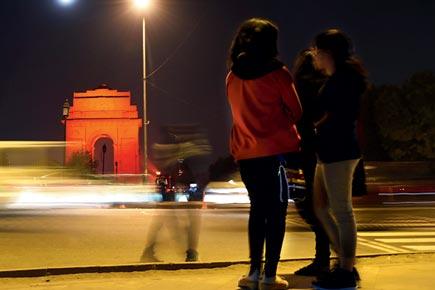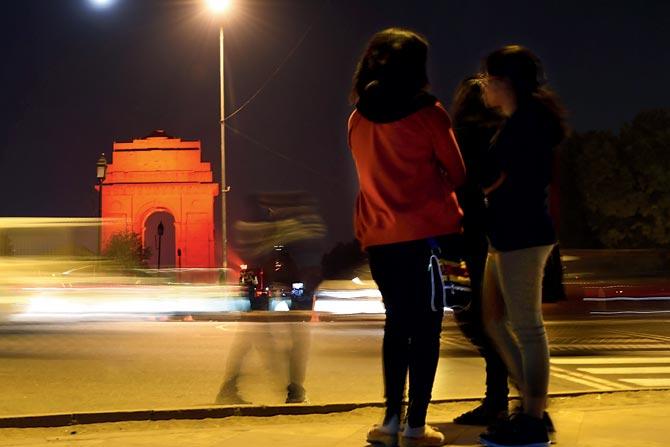I’ve been grinning often while checking out my social media newsfeed. What’s making me grin? Posters I see for a march on March 8, International Working Women’s Day, in Delhi, from a growing group of university women, organising under the name Pinjra Tod.

 I’ve been grinning often while checking out my social media newsfeed. What’s making me grin? Posters I see for a march on March 8, International Working Women’s Day, in Delhi, from a growing group of university women, organising under the name Pinjra Tod. Posters that show they’re determined to overturn infantilising, restrictive hostel curfews — made even more suffocating post 2012 in the name of protecting women — unfair university library rules. Their posters demand sexual harassment committees in colleges, challenge the idea that patriarchal norms should be the default settings in institutional rules. I’ve felt invigorated by their seriousness and commitment as I’ve followed their announcements of meetings in towns across India, their videos, songs and slogans.
I’ve been grinning often while checking out my social media newsfeed. What’s making me grin? Posters I see for a march on March 8, International Working Women’s Day, in Delhi, from a growing group of university women, organising under the name Pinjra Tod. Posters that show they’re determined to overturn infantilising, restrictive hostel curfews — made even more suffocating post 2012 in the name of protecting women — unfair university library rules. Their posters demand sexual harassment committees in colleges, challenge the idea that patriarchal norms should be the default settings in institutional rules. I’ve felt invigorated by their seriousness and commitment as I’ve followed their announcements of meetings in towns across India, their videos, songs and slogans.

ADVERTISEMENT
I’ve also followed with interest the journey of 400 Muslim women to Delhi last week, calling themselves the Bebaak (Fearless) Collective, meeting to discuss their issues, stuck between patriarchy and communalism.
It is a contrast to so much that we hear in other mainstream spaces while also talking about feminism.
I am intrigued how, in conversation upon conversation, young, professional, upper middle class women who claim to be feminist — or feminist-ish — express fear of being on the streets late at night, even in a city like Bombay. On probing if they’ve had bad experiences, one finds it is mostly fear on hearing media stories about rape.
As writers like Rukmini S and Flavia Agnes have shown, this creates a sense that the public space is rife with risk and that rapes by strangers are the norm, when the reality is that about 80-90 per cent of sexual violence is carried out by someone known to the victim or in the home space. Focusing on the space outside means we do not question the space inside — the domestic, private space where gender inequality is seeded, where it is carried out in emotionally crippling subtle power dynamics as well as physically threatening and restricting overt power assertion. The idea of the outside world as dangerous is the oldest one that’s kept women in a restrictive private space in fact.
I often hear such well-intentioned women talk about how “feminism in India is restricted to upper class women” and how they would like to empower other women. In saying this, they show their ignorance of ‘other’ women’s reality — by which we mean Dalit women, rural women, working class women — both, their issues and their feminist agitations. This ignorance of Indian feminist history in the information age is puzzling. Isn’t it time to come out of that prison of vagueness?
With the budget or the recent announcement of an all-male jury to decide the 50 most influential women in advertising and marketing, to the promotion of RK Pachauri, we have seen response from independent webzines, some social media irritation but little organised response from corporate women's interest groups holding their space accountable to women’s concerns. It feels like extending the not questioning one’s personal space to the professional one.
In some kinds of ‘mainstream’ feminist-ish events one often hears a puzzlingly conciliatory tone, with disclaimers that their feminism is not about male bashing. This conceptual eyelash fluttering as a strategy to draw men into the discussion is mostly fail. Why give credence to such prejudiced stereotyping? Why not unapologetically set the terms for your discussion?
It’s a pretty good time to take inspiration from the movements around us, to make the personal political, to spurn that Digene pink spa voucher feminism and reclaim some serious anger, power, rights, history, intersectionality, feminism this March 8, to sing, “you may say I’m a feminist, but I’m not the only one (or only kind)”! Go for it.
Paromita Vohra is an award-winning Mumbai-based filmmaker, writer and curator working with fiction and non-fiction. Reach her at www.parodevipictures.com
 Subscribe today by clicking the link and stay updated with the latest news!" Click here!
Subscribe today by clicking the link and stay updated with the latest news!" Click here!







